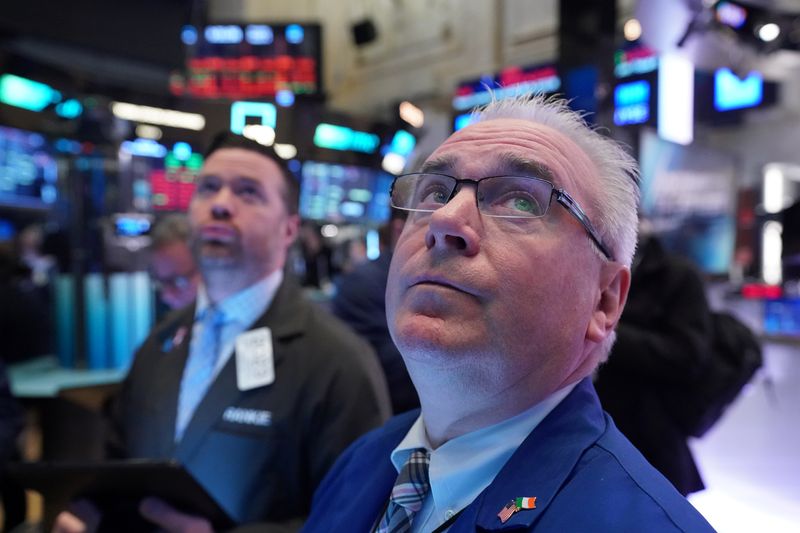By Stephen Culp
NEW YORK (Reuters) - Wall Street suffered its biggest one-day loss since the 2008 financial crisis on Monday and recession worries loomed large as tumbling oil prices and ongoing coronavirus fears prompted investor panic on the anniversary of the U.S. stock market's longest-ever bull run.
All three major U.S. stock averages plunged sharply at the opening bell, triggering trading halts put in place in the wake of 1987's "Black Monday" crash. The Dow plummeted a record 2,000 out of the starting gate on the day marking the current bull market's 11th year.
During the session, the Dow came about a 10th of a percent from confirming a bear market, or 20% below its record peak.
The S&P 500 closed about 19% below its all-time high set on Feb. 19.
"It's certainly one for the history books," said Matthew Keator, managing partner in the Keator Group, a wealth management firm in Lenox, Massachusetts. "The markets are now pricing in a high probability of recession."
Peter Cardillo, chief market economist at Spartan Capital Securities in New York, agreed.
"There's a lot of fear in the market and if the price of oil continues to move lower it's an indication that a global recession is not far away," Cardillo said.
The CBOE Volatility index (VIX), a gauge of investor anxiety, touched its highest level since December 2008.
Benchmark 10-year U.S. Treasury yields briefly sank to 0.318%, a record low.
The sell-off began over the weekend when an oil supply pact between Saudi Arabia and Russia collapsed and both countries vowed to hike production amid weakening global demand due to the coronavirus and signs of an economic slowdown.
Oil prices crashed to their lowest since the 1991 Gulf war, with Brent crude futures (LCOc1) closing down 23.88% and front-month WTI falling 25.1%, sending the S&P Energy index (SPNY) sliding 20.1%, its largest one-day drop on record.
Global markets were already on edge as worldwide confirmed cases of COVID-19 surged past 110,000, causing widespread supply disruption and large-scale quarantine measures as governments scramble to contain the outbreak.
The Dow Jones Industrial Average (DJI) fell 2,013.76 points, or 7.79%, to 23,851.02, the S&P 500 (SPX) lost 225.81 points, or 7.60%, to 2,746.56 and the Nasdaq Composite (IXIC) dropped 624.94 points, or 7.29%, to 7,950.68.
All 11 major sectors of S&P 500 ended the session deep in red territory, with energy and interest rate-sensitive financial (SPSY) stocks suffering the largest percentage losses.
Boeing Co (N:BA) was the biggest drag on the Dow, tumbling 13.4% following the Federal Aviation Administration's (FAA) rejection of the planemaker's proposal regarding wiring systems in place on its grounded 737 MAX aircraft.
Apple Inc (O:AAPL) shares fell 7.9% after data showed the company sold fewer than 500,000 smartphones in China in February amid the coronavirus crisis.
Chipmakers registered their largest drop since October 2008, with the Philadelphia SE Semiconductor index (SOX) falling 8.3%.
Declining issues outnumbered advancing ones on the NYSE by a 17.86-to-1 ratio; on Nasdaq, a 19.11-to-1 ratio favored decliners.
The S&P 500 posted one new 52-week high and 229 new lows; the Nasdaq Composite recorded nine new highs and 1,049 new lows.
Volume on U.S. exchanges was 17.22 billion shares, compared with the 11.05 billion average over the last 20 trading days.
(GRAPHIC: S&P energy relative to S&P 500 vs crude - https://fingfx.thomsonreuters.com/gfx/mkt/13/1608/1583/Pasted%20Image.jpg)
